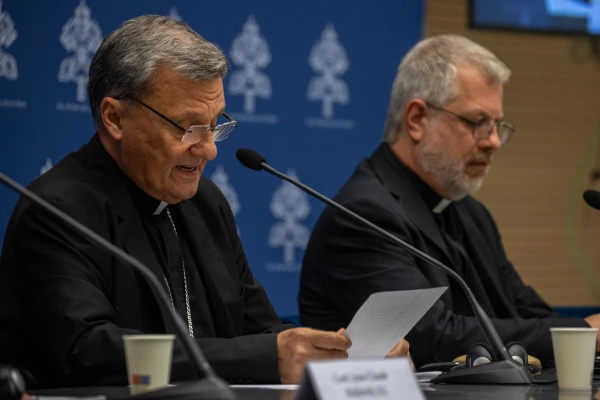This Tuesday, July 9, the Vatican presented the Instrument of Labor 2, the working document that presents the key themes that will guide the second and final session of the Synod of Synodality, to be held in Rome in October 2024.
The document indicates that the issue of the female diaconate “will not be the subject of the work of the second session”, although it specifies that “it is good that the theological reflection continues, with appropriate times and modalities.”
Receive the main news from ACI Prensa by WhatsApp and Telegram
It is increasingly difficult to see Catholic news on social media. Subscribe to our free channels today:
In this way, remember that, at the request of Pope Francis, certain current issues are being studied by a group of experts and bishops from different parts of the world. They also report that these groups must conclude their work before the end of June 2025.
Document origin
The 52-page document, prepared by a group of theologians and approved by Pope Francis, is born from the reflections of the Episcopal Conferences, the Eastern Catholic Churches and other international ecclesiastical realities.
It is also the result of the reports presented by the parish priests after their meeting in Rome regarding the Synthesis report of the first sessionheld in October 2023.
After the drafting during this last session of a final document relating to the entire process carried out so far, the Synodal Fathers will offer the Holy Father “guidance on the steps to be taken and the concrete ways to do so” with a view to the preparation of a future exhortation. postsynodal.
The Synod “does not end in October”
Furthermore, the working document insists that the Synod does not end after the October assembly, but that it is “a path of conversion and reform” that must continue in each of the realities of the Church, and also dedicates a section to clarify and define the term synodality.
During the press conference this Tuesday morning, Cardinal Mario Grech, Secretary General of the General Secretariat of the Synod, highlighted the “enthusiasm for the synodal methodology,” and highlighted that pastoral theological discernment has been launched in Africa. to accompany people in situations of polygamy.

Authority in the Church
The document published this July 9 specifies that synodality “in no way implies the devaluation of the particular authority and the specific task that Christ himself entrusts to the Pastors.”
Rather, the text continues, “it offers the most appropriate interpretative framework for understanding one’s own hierarchical ministry, inviting the entire Church, including those who exercise authority, to true conversion and reform.”
Women’s participation
A section of Instrument of Labor expresses that “awareness has grown of the variety of charismas and vocations that the Holy Spirit constantly raises in the People of God.”
For this reason, he points out the need to discern and reflect more deeply “on the question of participation in relation to communion and mission.”
To this end, it highlights 3 “directions”: the need to “update” the ability to announce and transmit the faith, the renewal of liturgical and sacramental life, and a healthy and renewed reciprocity between men and women.
Regarding the latter, he emphasizes “the need to give fuller recognition to the charisms, vocation and role of women in all spheres of the life of the Church.”
They also recall that, “while some local Churches ask that women be admitted to the diaconal ministry, others reiterate their opposition” and inform that this issue “will not be the subject of the work of the second session.”
A “non-bureaucratic” Church
The document points out that during the synodal process “the call has emerged for a Church that is not bureaucratic, but capable of nurturing relationships: with the Lord, between men and women, in the family, in the community, between social groups.”
“The path taken up to this point has led to the recognition that a synodal Church is a Church that listens, capable of welcoming and accompanying, of being perceived as home and family,” it reads.
The tiredness and fatigue of bishops and priests
It also refers to the “fatigue” of bishops and priests, a result of the difficulty in “truly walking together in their shared ministry.”
He proposes synodality as “an opportunity for liberation from these fatigues,” while pointing out that “this path of conversion will imply a new way of thinking and organizing pastoral action, which takes into account the participation of all the baptized.”
Along these lines, he appeals to lay co-responsibility and emphasizes that the episcopal ministry should not be “monarchical,” conceived as an accumulation of prerogatives “from which any other charisma and ministry derives.”
Transparency and clericalism
The document indicates that clericalism is the consequence of the lack of transparency and accountability when ordained ministers “are not accountable to anyone for the exercise of the authority vested in them.”
Furthermore, it specifies that this is not limited only to abuses or the financial sphere, but also includes pastoral plans, methods of evangelization or the Church’s respect for the dignity of the human person.
Pope Francis, “guarantor of synodality”
The text emphasizes that the Bishop of Rome is the “visible principle of the unity of the entire Church,” as well as “the guarantor of synodality.”
Remember that “it is up to him to summon the entire Church to synodal action, calling, presiding over and confirming the results of the Synods of Bishops; It is up to him to ensure that the Church grows in synodal style and form.”
